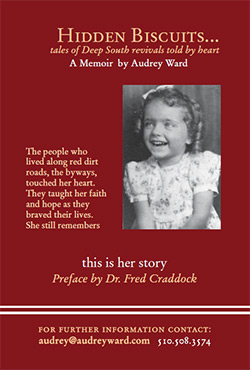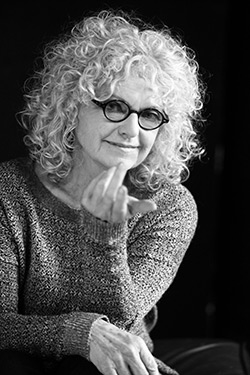III BISCUITS FOR FRED BRENNING CRADDOCK:
30 APRIL 1928 to 6 MARCH 2015
Audrey Ward
He saw through our pretensions, compelled us to go deeper,
and used small words and stories to deliver stunning revelations.
Dr. Fred Craddock, born on a farm in East Tennessee, came to inhabit the
world of higher education with astonishing grace and brilliance, yet his heart never left
the people of Appalachia: in his retirement, he established the Craddock Center in
Cherry Log, Georgia, for children who have few opportunities.
Fred traveled red dirt roads with Jesus.
What a man.
That’s the thing about Fred Craddock: you never saw it coming. The quiet building of a keen mind, collecting solid points along the way with whimsical grace would hit the mark and stun with quiet simplicity. While he could read or study in French, German, Hebrew and Greek, and accomplish a series of lectures at Yale Divinity in a single bound, his use of Deep South country colloquialisms was just around the corner. He’d toss one in when you least expected it and bring you to your knees with laughter.
Those lectures for Yale concerned the “Pre-existence of Christ.” They turned into a book which was described the following way in notes for the advance copy:
The oriental belief in pre-existence was widely held in the ancient world. This is a study of various uses of the concept in the New Testament.
Whether other seminary professor in Oklahoma—where he was then teaching–were even tiptoeing around such subjects in 1969, I would be interested in knowing.
Here’s what he says in the Introduction:
This is an invitation to join in an exploration that may seem strange, perhaps even unreal, in that it focuses upon a category of being that does not correspond to reality as we experience it. In fact, the word “pre-existence” does not fit comfortably in the vocabulary of Western man. It has an exotic ring. It seems a fugitive word, escaped from a séance, wandering among us but not at home on the well-lighted streets of our empirical thoughts.
See what I mean? Just when you think you’re going to be raised to heights of lofty intellectual thought, he slips in that idea of a ‘fugitive word’ and you’re grinning again.
When I discovered this book as I plundered the shelves of a friend’s library early one morning while the household slept, I was so taken by the contents—having read half of it before coffee and then rereading it aloud for my host as she prepared breakfast—I wrote to him immediately. “It’s time to re-issue this book, Fred! Really. The world is ready for it now.” And a few months later when we were visiting in Cherry Log, he said, “The President of Yale Divinity called me a couple of months back and said, ‘Fred, it’s time to re-issue that book…’” Then he recounted how he had responded that no one wants to read that stuff, only to have my letter come along soon after. “Well, guess I’ll have to look into it, and this time I’ll have you write the Preface,” he drawled with a sly grin, adding, “Oh how the tables turn.”
But the single question in his voice that turned my world topsy turvy was, “When are you going to write about your family, Audrey?” The chairs had been pushed back from the lunch table during a Cherry Log, Georgia, preaching seminar when Fred Craddock threw down that verbal gauntlet. I rationalized and stuttered about already doing 3,000 miles of research, um…well, you know. But Craddock fervently wanted the record of a country preacher and the people who heard him so he didn’t let me slide away from the idea quite that easily: “Hidden Biscuits: Tales of Deep South Revivals Told by Heart” is the result.
But he wasn’t leaving me alone to flounder in questions with few answers, he also said that if I’d come back to Georgia in July of that year, I could tell him the stories while sitting on the front porch of the Craddock Center; record them, and we’d have the book. Well, I did that and though we certainly had some recordings of conversations, the book itself materialized through a far more circuitous route.
What we also had, however, was a pattern of visits repeated every six to nine months until his death on Friday, 6 March 2015. I flew back from California for the viewing and the service at Cherry Log Christian Church (which he founded after his retirement) on the following Monday. Even the countryside felt his absence. Grieving, it seemed to me, was present in the desolate, barren season of late winter preceding the bright, tender colors of spring.
Our last visit was January of this year. After the couple of hours at the little hilltop house used by the Craddock Center in Cherry Log, where we—as was the custom—talked about everything and nothing, he was too spent for lunch at the Pink Pig Barbecue across the road.
Parkinson’s was bearing down on his voice so even meds used to alleviate the dreaded symptoms were not effective. What I did not know, but felt, was that there was a shadow already present on the hill a short climb from where we sat. By my next trip, just weeks away, a tent over the grave prepared for my friend would rest there.
He loved the Pink Pig and the Brunswick stew they cooked up. I suspected that it was the people who owned and ran it that he cared for most, reciting the genesis of the rough, unpainted establishment, as well as the current owners. Then there was the wait staff whom he always engaged in conversation. He appreciated the people and what interested them besides a paycheck. Fred would ask about their lives and their prospects for further education after graduating from Gilmer County High School. He noted potential and was sometimes successful in urging them forward, finding resources to support their efforts.
It was Fred who first used the phrase “Hidden Biscuits.” Nudging me beyond the writing, which he considered finished–though it would still go through a few more rewrites–he said, “Some day you’ll stand with an open book in your hand. The name of your message will be ‘Hidden Biscuits’ and you’ll tell about your dad’s kindness toward that young girl, Jolene. The ‘open book’ will be this one you’ve written.” Well, the title kept roiling around in my mind and on the final rewrite, I knew it had to be “Hidden Biscuits.”
When I was in Georgia last June, he said–Parkinson’s, making everything he did a miserable effort–“I feel that I know your father.”
“You do,” I responded, “and I’m confident—somehow—that he knows and loves you, too.” My father, who died in 1994, would have cherished Fred, a man with worldwide fame as a preacher and theologian. Yet, in spite of lofty degrees and arresting capacity for language and scholarship, a man who listened carefully to those with little or no education: hill people who never had the chance for literacy or learning. In his retirement, Dr. Craddock established The Craddock Center, (“Happy and Hope: We Deliver”) for early childhood literacy resources so that the children of these beloved people would have reading and education opportunities.
One of the details about those who run this Center that I most appreciate is that not only do they provide books and stories plus warm coats, caps and backpacks to families in nine counties in the Tri-State area—Georgia, North Carolina and East Tennessee—but they remind people of their own culture: music, storytelling and dance are included in gatherings and summer camps. With the reach of electricity, now, even into the crevices of the Blue Ridge Mountains, old traditions often lose to television, internet, and games. But Dr. Craddock recognized that this history has rich golden veins of treasure that are well worth the effort used in preserving them.
The friendship we began over the first twenty years of acquaintance through classes and conferences, and a deeper level of understanding forged through the work on Hidden Biscuits in the recent seven, forms a pearl of great price. Dr. Craddock was the featured preacher for the Earle Lectures at Berkeley’s Pacific School of Religion in the early 90’s. At the end of preaching on the Beatitudes one evening, he told this story:
“Back on the farm in East Tennessee, the kids used to play hide and go seek. I was so small, I could fit, wedged in, under the porch step. I’d think “No one will ever find me here!” Then, after some time had passed, I’d realize “No one will ever find me here,” and I’d stick out a foot, or an elbow.
Now, what did I want?
I wanted what every person in this room wants.”
And now, having pondered that story all of this time, I’m beginning to realize that this is the gift these years of Fred Craddock’s friendship have given me.
Audrey Ward, 30 April 2015 Cherry Log, Georgia,
for the opening of the new location of the
Craddock Center on Fred Craddock Drive

